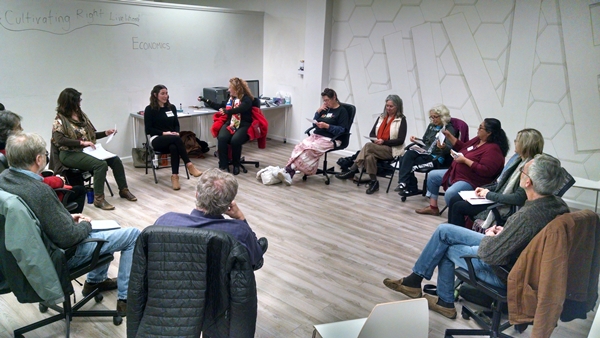By Kassie Munro and Nicole Newell, Program Managers

The economy can be difficult to understand, yet we all can identify the many problems that we are facing as individuals and as a society in our current system. Sustainable Solano has committed to attend the Systems Change & the Next Economy workshop series presented by Santa Cruz Permaculture and report back on what was learned through a series of presentations and community circles at Green Hive Spaces in Vallejo. This gives us an opportunity to explore solutions on how to create a world that benefits the whole within our Solano County community.
Economist Della Duncan presented the first workshop we attended in Santa Cruz, titled Cultivating Right Livelihood: Embark on the path of inner and outer transitions for a more beautiful and sustainable world.
It was a weekend of questioning the goals of our current broken economic system and soul-searching to find our place in the solution. Each section that she taught began with a tingsha meditation bell and a mindfulness practice; feet on the ground, elongated spine and paying attention to breath. She created a safe space to be vulnerable and explore our inner world and provided opportunities for us to share our insights with each other.
The workshop can be described in the Frederick Buechner quote that Della modified: “Your right livelihood is the place where your deep gladness meets the world’s hunger at your highest potential.”
Right Livelihood doesn’t have to be something that you are paid for. Ask yourself these questions:
- What makes you come alive?
- Where do you find deep gladness?
- What are your skills?
- Which hunger in the world deeply breaks your heart?
Many of the problems facing our communities today are daunting and can leave us feeling overwhelmed. The workshop focused on self-reflection and helping to make sense of the current world inside our own hearts and minds. Rather than suggest solutions to the world’s economic problems, Della invited us to consider alternative ways of thinking about the economic system and its shortcomings and focused on ways that we can take action in our own lives. These actions may not change the world overnight, but they give us hope in the face of the unknown and allow us to take comfort in participating in shaping the future, which is all that can be asked of any one person.
Sharing an abbreviated version of our learnings, and opening up about our personal experience at the workshop with our community here in Solano County was insightful. The complexity of our planet’s current economic, political, cultural and environmental condition is an emotional subject. Creating a safe place for our neighbors to come together and share their personal experiences — hopes, fears, aspirations — is an important part of the journey forward. It was inspiring to see members of the community come out to be part of the discussion and share their interest in finding solutions.
The funding for Sustainable Solano’s team training at the “Next Economy” course at Santa Cruz Permaculture was provided by Solano Community Foundation through their NPP Capacity Building grants program. Community conversations are made possible through a grant from the Peaceful World Foundation. Thank you to both organizations!
We will continue to share insights at upcoming workshops at Green Hive Spaces in Vallejo in the coming months. Please join us at one or all of these events to further the discussion on the next economy in our community.
Essential Knowledge for Transition, 6 pm, March 7
Few of us realize the extent to which the design of the money system, the economic system and the financial system constrains our choices and frustrates our desire to bring forth a more healthy and compassionate world. The purpose of this talk will be to provide an accessible understanding of money, the economy and investing.
Restorative Economics, 6 pm, April 4
Join us for a discussion on different strategies for a just transition to a more sustainable, equitable and just economy. Restorative economics takes a restorative justice approach to restoring and reinvesting in low-income communities of color through the establishment of community-owned and community-governed projects for self-determination and shared prosperity.
Designing the Regenerative Economy, 6 pm, May 2
Join us to discuss the design principles and strategies needed for vocation and regenerative enterprise design. We’ll discuss how we could redesign the economy for security, prosperity and a stable climate with transformation based on permaculture design principles, methods and ethics for an economy that benefits all life.

